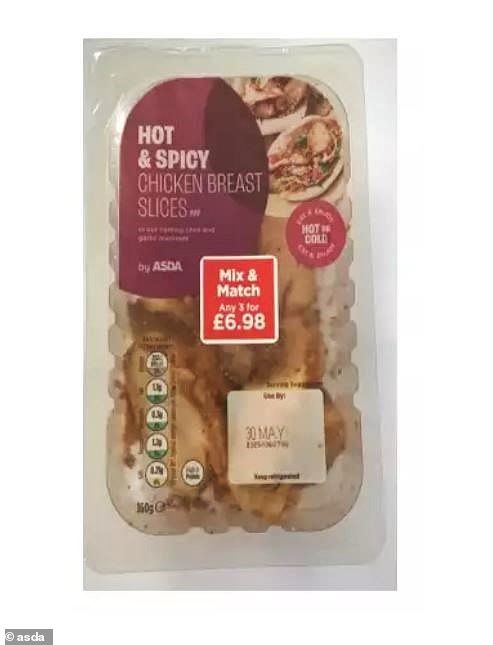Asda is urgently recalling its own-brand chicken breast slices over fears that the product was packaged with an incorrect use-by date.
Food safety watchdogs have issued an alert about the supermarket’s Hot and Spicy chicken breast slices.
Affected packs are those weighing 160g and with a use-by date of May 30 this year.
Asda stated: ‘If you have purchased Asda hot and spicy chicken breast slices with a use by date of the 30 May, please bring it back to your nearest store where you will be given a full refund.’
It added: ‘We are very sorry for any inconvenience caused.’
The Food Standards Agency (FSA), which published the alert, issues recalls when problems are spotted with food that means it should not be sold.
The regulator added: ‘Point of sale notices will be displayed in all retail stores that are selling this product.
‘These notices explain to customers why the product is being recalled and tell them what to do if they have bought the product.’

Asda have recalled their hot and spicy chicken breast slices over fears of food poisoning
This comes as concerning new research suggests a potentially lethal food poising bug found in chicken could be driving a surge in late stage colon cancer cases.
Campylobacter is the most common source of food poisoning, often found on raw chicken. It typically causes diarrhoea, nausea and vomiting that gets better naturally within a week.
In severe cases, however, it can be life-threatening for vulnerable groups, including young children, the elderly and immunosuppressed.
Early studies have now found a common strain of the bacteria could speed up colon cancer progression by causing DNA damage.
While the study could not prove that the bug is directly responsible for rising rates of the disease, researchers said campylobacter jejuni may put the public at higher risk.
It comes as Italian scientists last week discovered that regularly eating chicken could double your risk of dying from 11 different types of cancer, including colon and stomach.
Those that consumed over 300g of poultry — equivalent to about four portions — per week, had double the risk of dying from a digestive cancer, compared to those who are less than one portion of poultry per week.
In the UK, supermarkets must report figures on the prevalence of campylobacter among their poultry products every three months so Food Standards Agency (FSA) officials can monitor food quality.

Supermarkets must report data on the prevalence of campylobacter among their poultry products every three months so the FSA can monitor food quality. Retailers are supposed to ensure that no more than seven per cent of their chickens breach this levels.
They share the proportion of their raw chickens which have more than 1,000 colony-forming units per gram (CFU/g) of campylobacter.
At this level, chickens are considered contaminated and carry a higher risk of food poisoning.
Apart from the misery and pain of the illness itself, the FSA estimates the bacteria costs the economy some £900million a year in terms of NHS treatment and lost days at work.
To avoid food poisoning, people should make sure they cook chicken thoroughly, separate meat from other foods, keep it in the fridge and wash their hands and utensils after touching raw meat, according to the FSA.
Chicken should also not be washed because it may splash bacteria elsewhere in the kitchen, it added.
This article was originally published by a www.dailymail.co.uk . Read the Original article here. .


